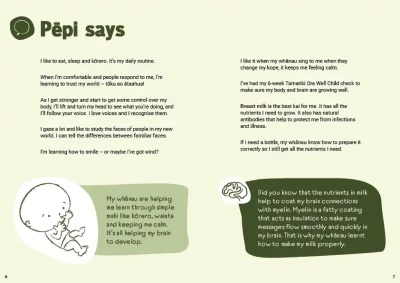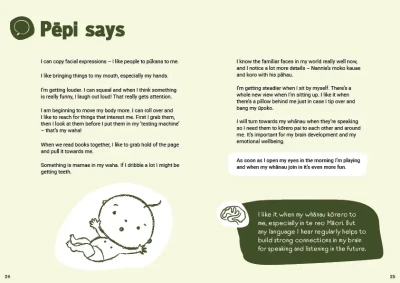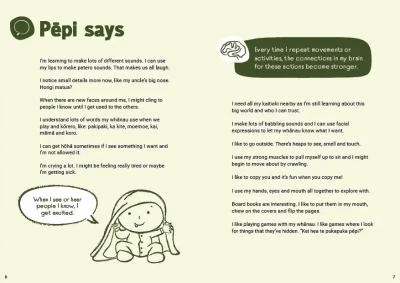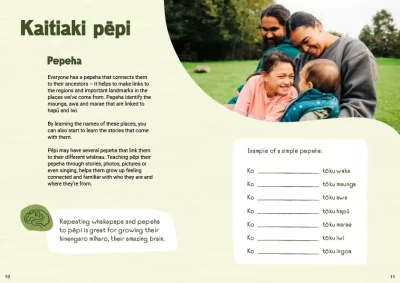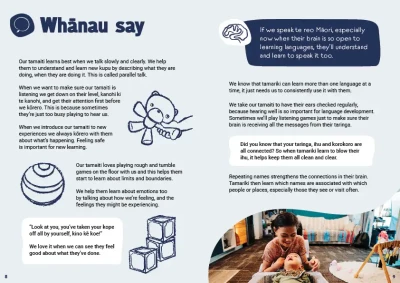
Tukuna ahau kia mahi, kia mōhio ai ahau me pēhea te ako Let me do things over and over again
Repetition and routines strengthen babies' brain connections. Parents can support this brain development and help them learn new skills by providing opportunities for baby to repeat activities many times over.
By Brainwave Trust Aotearoa
Babies like to do things over and over. This is how they learn to do things and figure out how things work, which builds their confidence. It also strengthens connections in the brain. When brain connections are used often, they become much stronger and are more likely to build permanent pathways.
Strengthening brain connections
Connections that are used over and over again as baby’s experiences are repeated become coated with ‘myelin’. Myelin is a fatty coating that forms a layer around the pathway, and makes messages travel along the pathway much faster and more efficiently. A good example of this is provided by watching baby’s movements in the first couple of months. Movements can be jerky when baby is tiny, but as baby repeats the movements, and the connections in the brain become stronger, the movements become much smoother.
Repetition for parents
It’s not just the things that baby does over and over again that help build strong connections. Parents can also repeat things to help baby learn. Baby may want the same book read many times, or may love to hear their parents sing the same song or say a rhyme repeatedly. Any experiences that are repeated many times strengthen the connections in the brain that help them learn new skills. It doesn’t matter how many times baby wants to repeat an activity or experience. Babies who are interested and involved in an activity are learning from it.
When their baby is struggling with a task, rather than completing the task for them, parents can provide just enough help that the task is still challenging but baby can manage it without being overwhelmed. This support is called ‘scaffolding’ and helps a child problem-solve.
As a child become more capable, they develop a sense of independence. There are so many things they want to do for themselves but they don’t yet have the skills for, and they may feel that things are out of their control. This can be a frustrating time for them. They need to know that their parents there as a safe base when they need reassurance or a cuddle.
Parents can also show their delight when their baby tries hard to master a new skill, whether they succeed or not.
Routines are another way for baby to learn through repetition. Knowing what’s coming next – like bath time, or settling to sleep – helps baby feel safe and secure and builds confidence. Simply understanding the order that things happen throughout the day will develop skills that eventually help baby with maths, reading and writing.
Dads are important
Although mums often provide much of the caring for baby, dads have a huge contribution to make. As babies become more independent and more curious to explore their environment, dads are often the ones who encourage them to solve challenges in their play and exploration.
Summary
- Brain connections that are strengthened through repeated use become coated in myelin, which makes the pathways faster and more efficient.
- Parents can ‘scaffold’ (support) to help baby learn new skills.
- Although babies become more independent, they still need a parent close by for comfort.
- Routines help baby learn.
- Dad has an important role to play in helping baby problem-solve.
Brain development information has been woven throughout the Whakatipu booklets, describing what's happening for pēpi in their 'hinengaro mīharo’ (amazing brain) at different stages. This gives parents simple neuroscience information to support them with their parenting:
- Te Pihinga 1, page 7 — myelin makes connections more efficient
- Te Pihinga 1, page 25 — repetition strengthens connections
- Te Pihinga 2, page 7 and 10 — repetition strengthens connections
- Te Kōhuri 1, page 9 — repetition strengthens connections
Other resources
- Sunderland, M. (2007). What every parent needs to know. Publisher: Dorling Kindersley Ltd – ISBN: 9781405320368
Helpful resources for whānau
-
Growing great brains<
Growing great brainsJason Tiatia from the Brainwave Trust shares some tips on helping pēpi grow great brains.


